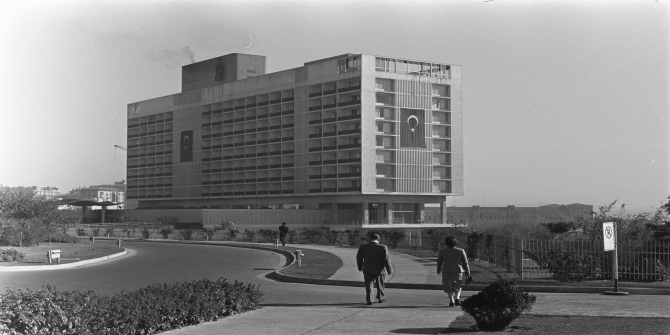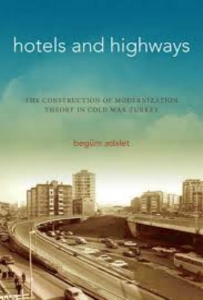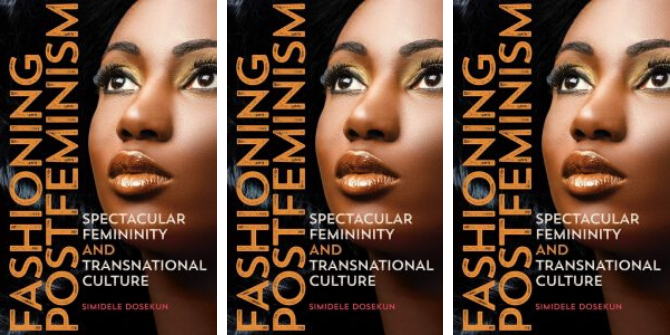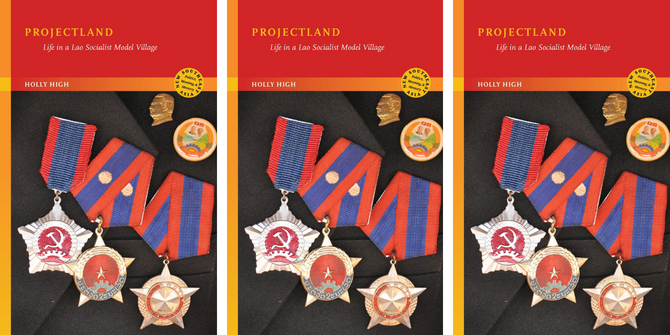In Hotels and Highways: The Construction of Modernization Theory in Cold War Turkey, Begüm Adalet offers an account of the historical construction of the ‘Turkish Model’ as a manufactured product of American Cold War policy juxtaposed with Turkish domestic politics. Exploring the conceptualisation and execution of modernisation through examples of survey research, infrastructure and architecture, this is a valuable study of the politics of knowledge production, finds Juvaria Jafri.
Hotels and Highways: The Construction of Modernization Theory in Cold War Turkey. Begüm Adalet. Stanford University Press. 2018.
Hotels and Highways: The Construction of Modernization Theory in Cold War Turkey, authored by Begüm Adalet, is a study of the politics of knowledge production. The context is international development in the era of the Cold War, which Adalet uses to explore the authoritarian and hierarchical elements of what came to be presented as the ‘Turkish Model’. A focal point of this book is the fragility of conviction that underlies theory construction; the case of Turkey brings forth encounters that:
lay bare the political implications of developmental laboratories, which were material and tangible sites that also served rhetorical and social functions, sanctioning certain ideas and practices of modernization and expertise while disavowing others.
A central premise of the book is that the Turkish model of modernisation is a manufactured product of American Cold War policy juxtaposed with Turkish domestic politics. This is expressed as Adalet acquaints the reader with the key personalities and practices that shaped how modernisation was conceptualised and executed.
One such personality was Dankwart Rustow, the German-born, American scholar of democracy and practitioner of development. Rustow’s familiarity with Turkey is partially attributed to the time he spent there as a teenager when World War II interrupted his studies in Berlin; as a result, he went to live with his father, the economist Alexander Rustow, based at Istanbul University. Following this, he moved to the USA for his undergraduate studies, and later completed a PhD at Yale, eventually returning to Turkey in the 1950s for research funded by the Rockefeller Foundation and Princeton University.
Rustow’s reservations about modernisation theory pertain to the notion of linear growth, which posits that economies must undergo a teleological sequence of stages before becoming ‘Westernised’. Informed heavily by the experience of Europe following the Marshall Plan in the aftermath of World War II, this approach is based on a distinctly Western model of modernity. Rustow’s unpublished work shows skepticism towards core ideas associated with this stance: one such belief is that some countries have followed a specific path that has led to their becoming modern; another is the corollary idea that other countries will, once ‘Westernization has run its course’, replicate Western countries, which are in themselves assumed to be somewhat homogeneous. Despite these misgivings, Rustow continued to approach Turkey as a laboratory of comparative politics, where ‘raw data’ was used in structural-functional schema that aspired to make political science more ‘scientific’.
 Image Credit: Hilton Hotel Istanbul, 1959 (Harry Pot/Anefo/Dutch National Archives Public Domain)
Image Credit: Hilton Hotel Istanbul, 1959 (Harry Pot/Anefo/Dutch National Archives Public Domain)
The use of raw data is exemplified in a chapter about survey research. Adalet’s account of the American sociologist, Daniel Lerner, and his survey and interview work in Turkey highlights the conceptualisation of a ‘modern mindset’. This entails an individual-level transformation through the acquisition of empathetic skills associated with modernity. Survey methodology was employed to measure these, and often led to the inference that because interview participants lacked the ability to place themselves in a different context, they lacked the empathy that was a marker of modernity. Adalet problematises these findings by noting their tendency to spill over from measurement and description to the ‘performance of the very categories — modern, transitional, and traditional — that they sought to explain’. Particularly troublesome is the comparison that Lerner and his co-author David Reisman made between their Turkish respondents and those in Arkansas who they describe as ‘hillbilly’. But there is no such likeness found between the French elite and Arab peasants who also share traditionalism: to suggest one would mean undermining the archetypes crafted to suit the findings from the Turkish laboratory.
The use of key personalities also demonstrates the contested nature of knowledge production in what is perhaps the meatiest section of the book, on infrastructure and architecture. Whereas the first two chapters highlight the Western, especially American roots, of the practices underlying the modernisation project in Turkey, the final three discuss the hotels and highways that ground the perception — strongest in the 1960s, and then again after 2011 — of Turkey as at once modern, democratic, liberal and Islamic. So, in the recent setting of the Arab Spring, Egypt, Tunisia and others ostensibly aspired to be like Turkey. Such perceptions omit the hierarchical and authoritarian nature of the practices through which modernisation theory, as a conduit of American foreign policy and capitalism, was deployed in Turkey.
For instance, the issue of hierarchy is apparent in the project of Turkish road-building that sought to replicate the American highway. This was proposed in a mid-1940s document by Vecdi Diker, an engineer employed by the Turkish Ministry of Public Works, whose report was based on the few months he spent travelling across the USA by car through a range of states, visiting research institutes, universities and factories. But Diker’s recommendations only became known in 1948, when Harold Hilts, deputy commissioner of the US Bureau of Public Roads, offered similar proposals in Turkey’s Highway Situation, a report prepared after a successful negotiation by Diker to secure five million US dollars from the Truman Doctrine funds to purchase highway equipment.
Another instance is the authoritarian aspect of tourism promotion. Adalet highlights this by presenting the biography of the Istanbul Hilton: among its overlooked features are contestations over the architectural design and the dispossession of those deemed to be ‘internal foreigners’. Central to tourism promotion initiatives was a narrative of hospitality, which Adalet extracts from the speeches and autobiography of the hotelier Conrad Hilton. The expansion of the hotel industry is ascribed a variety of meanings that extend beyond profitability and encompass countering Communism to safeguard ‘the free world’ and to win over the hearts and minds of newly independent countries. The construction of various Hilton hotels was seen as a facet of American foreign policy and an economic strategy to shift dependence away from aid. This notion of hospitality is an extension of the empathy project and problematic because of the pressing demands it exerts on guest behaviour, or more specifically ‘the dictates of the proper relationship between guest and host’. Additionally, the claim of the Istanbul Hilton to be a site of ‘authentic’ displays of hospitality subjected local traditions to the pressures of conformity demanded by modern tourism. The design of the Istanbul Hilton — described as international and oriental — is from an uneasy, but generally uneventful, collaboration between two architects: the American Gordon Bunshaft and the Turkish Sedad Eldem. Eldem’s complicity in a project of erasure through which various ethnic and religious groups of Turkey — including Armenians, Kurds, Greeks, Jews and Alevis — are subsumed into a single Turkish identity is reflected in his diary observations: these comment on how Turkish art has been dislocated by European products.
The concluding section of the book brings Adalet’s observations into the present-day realm and empirically exemplifies how international relations, foreign policy, political economy and development intersect. Many scholars now avoid the use of modernisation terminology, but this has not prevented its salient features being invoked during reconstruction projects in Afghanistan and Iraq. And within a domestic Turkish context, the urban development proposal that was met by protests in Gezi Park can trace its neoliberal roots to a fixation with construction-based economic growth. Adalet’s objective is of course not to comment on whether or not, or how, such development should occur, but to question the knowledge on which such assertions are based.
Juvaria Jafri is a PhD Candidate at City, University of London. Her previous degrees are from SZABIST, Karachi, Pakistan, and the University of Toronto, Canada. Her doctoral research is on the political economy of inclusive finance and financial citizenship in Pakistan.
Note: This review gives the views of the author, and not the position of the LSE Review of Books blog, or of the London School of Economics.


 Find this book:
Find this book: 





1 Comments